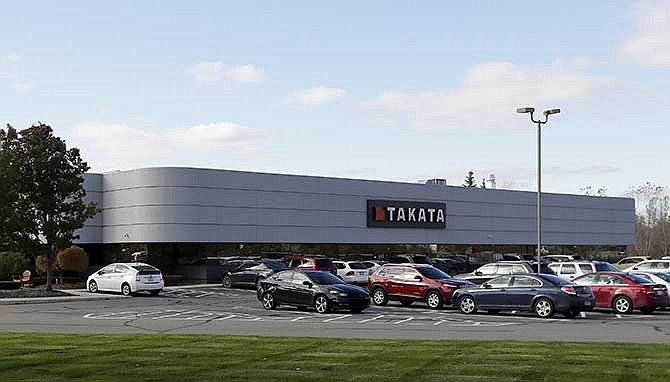RICHMOND, Va. (AP) - The U.S. government will fine Japanese air bag maker Takata Corp. $14,000 per day for failing to fully cooperate in a long-running investigation of faulty and potentially dangerous air bag inflators.
The inflators, in cars made by 10 companies, can explode with too much force, spewing shrapnel into drivers and passengers. At least six people have been killed and 64 injured worldwide due to problem.
Transportation Secretary Anthony Foxx announced the fines Friday in Richmond, Virginia, calling Takata a "bad actor" for allegedly dumping 2.4 million pages of documents on the National Highway Traffic Safety Administration without the legally required explanation of what's in them.
The agency demanded data from the company in two special orders last year, but it said Takata failed to provide an index so investigators know what to look for. Fines will accrue daily starting Friday until Takata fully explains the documents, the agency said in a letter to Takata.
The fines are another escalation in the public fight between NHTSA and Takata, which also refused the agency's demand to issue a nationwide recall of driver's side air bag inflators last year. Automakers recalled the cars on their own, however. Members of Congress have criticized the company for a lack of cooperation as the government, Takata and automakers try to track down the exact cause of the inflator problem.
Takata officials have said publicly they are working with the agency, but Foxx said that's not true. "We have a very serious defect issue. We're working as hard as we can to get defective (cars) off our roads. ... We will not tolerate this."
NHTSA's letter also threatens depositions of Takata employees and court action from the U.S. Justice Department, which already is investigating the company.
In a statement, Takata disagreed that it hasn't cooperated. The company said it turned over documents, meets regularly with the agency and has explained testing. Tests so far support Takata's view "that age and sustained exposure to heat and humidity is a common factor in the small number of inflators that have malfunctioned," the company said.
Takata also said it has increased production of replacement parts and is working with competitors to support automaker recalls. "We remain fully committed to cooperating with NHTSA," the statement said.
Takata's inflator propellant, ammonium nitrate, can burn faster than designed if exposed to prolonged airborne moisture. That can cause it to blow apart a metal canister meant to contain the explosion. So far, automakers have recalled about 17 million vehicles in the U.S. since 2008, and about 22 million globally due to Takata inflators. There could be as many as 30 million vehicles with Takata air bags nationwide.
Fines from NHTSA are capped at $35 million per infraction. Since Takata is alleged to have violated two orders, it could be fined up to $70 million. But at $14,000 per day, it would take nearly 1½ years to reach the cap.
Takata may keep paying the fines rather than guiding NHTSA to documents that could bring bigger penalties, said Kelley Blue Book Senior Analyst Karl Brauer, who said such a decision is probably a cost of doing business "that they can roll into some budget line and not really even notice it."
Takata reported a $278 million loss in its most recent fiscal quarter, a reversal from a $74 million profit a year earlier.
Foxx announced the fines on a bus tour to promote a major transportation bill that would raise the maximum fine against companies to $300 million, triple NHTSA's investigations budget to $31.3 million and give it new authority to stop sales of defective autos that are an "imminent hazard."
Also in the bill are provisions requiring used-car dealers and rental-car companies to get recall repairs made before they can rent or sell cars.
NHTSA is continuing to pursue the national driver's side inflator recall from Takata, but the agency must find the cause of the failures to do that, Administrator Mark Rosekind said. Inflator tests are being done by Takata and automakers under NHTSA-approved protocols, he said.
In Miami Friday, U.S. District Judge Federico Moreno held the first hearing on more than 80 potential class-action lawsuits against Takata. Most seek damages for loss in vehicle values and have been consolidated for pretrial decisions. A smaller group of plaintiffs seek damages for injuries.
Moreno urged attorneys to agree on preserving inflators for tests by plaintiffs' lawyers, and NHTSA said Friday it would issue an order next week that makes inflators available for testing to protect the public but leaves some for lawyers.
Takata attorney David Bernick said recalled inflators are destroyed when tested.
Legal Affairs Writer Curt Anderson contributed from Miami. Krisher reported from Detroit.

